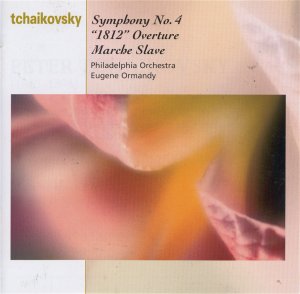There is nothing bony or emaciated about Ormandy's
sharply accented Tchaikovsky. Opulence and luxury radiate from the Fabulous
Philadelphians who are presented in all splendour in what I presume
to be a 1960s CBS recording. The venue, wherever it is, is far
from 'dead'. What a delight that the engineers did not try to tame the
reverberation. It is there for all to hear at the end of the first movement
Neither the booklet nor the case tell me when or where these recordings
were made. However the technical side represents a golden job with the
horns' aureate oratory and their raucous hoarseness, the woodwind pleasingly
close-focused and the sleek and silvery strings sounding like a million
dollars (at 1960s prices mark you). For the strings try 11.43 of the
first movement. Ormandy takes the symphony at an expansive pace though
there is impetuosity here too. Accenting and emphasis are full of care;
try 3.40 in the second movement. This might be a bit too much for some
people though I confess to lapping it up. If you want to find out whether
you will be put off sample at 3.32 in the Finale. There is so much here
to delight. Deliberation repays rewards in balalaika soundalikes in
the pizzicato scherzo.
Now if you want a rawer experience then go for Mravinsky
who roars his way through the Symphony with an orchestra (Leningrad
PO) just as unanimous as Ormandy's but wild and gaudy, furious and despairing.
Markevitch should also be heard. Ormandy is well worth hearing and he
will reveal many more passionate layers to the experience of the Fourth
Symphony. Towards the end of his life Ormandy re-recorded much of the
repertoire. His Sibelius symphonies (2, 4, 5 and 7) on RCA and his Tchaikovsky
symphonies (5 and 6) on Delos show some of his energy sapped and the
single unequivocal success from this winter renaissance was the EMI Classics'
recording of the Four Lemminkainen Legends.
The makeweights come in the shape of a hissy 1812
awesomely done but with far too intrusive a North American accent from
the Utah choir. I would object to an English accent as well … before
anyone jumps! The cannons sound synthetic in the extreme. The bells
however come across well and the great bass bell is allowed to resonate
though the vibration should have been allowed to run free for far longer.
The Hollywood glow on the violins at 7.49 is irresistible and what a
contrast with Golovanov on Boheme. The other filler is the Marche
Slave in which Tchaikovsky is far more Russian nationalist than
usual. Here he shows most fellow feeling with Rimsky and Borodin.
Two warhorses one of which is a very mixed bag and
a superbly opulent Fourth.
Rob Barnett


